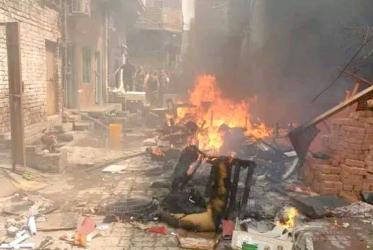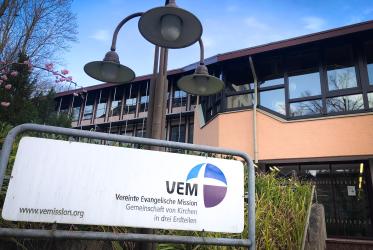28 March-3 April, 2005
In view of the complex and worrying situation following the death of General
Gnassingbe Eyadéma, President of the Republic of Togo, a situation which has
exacerbated the crisis prevailing in the country for several years now, the Evangelical
Presbyterian Church of Togo, the Catholic Church and the Methodist Church of
Togo, by reason of their common spiritual and social commitment, and through
their pastoral concern to support the Togolese people, issued an invitation to their
partners from various parts of the world to participate in an Ecumenical Mission
in Lomé from 28 March until 3 April 2005.
The three churches and their partners - La Communauté d'Eglises en Mission
(CEVAA), the Norddeutsche Mission (Bremen Mission), the World Council of
Churches (WCC/COE), DEFAP, the All Africa Conference of Churches (AACC/CETA),
DM -Exchange and Mission (Switzerland), EKD (the Protestant Church in
Germany), the Protestant Federation of France, the World Church Office of the
British Methodist Church, together with sister churches in the sub-region:
1. Met together to pray and demonstrate Christian solidarity to the Togolese people
in the difficult and testing times they are going through with deep and questioning
anxiety. The Ecumenical Delegation came to express to the Togolese nation
in all its dimensions the hope of the children of God which springs from the gospel
of peace and justice of our Lord Jesus Christ. It came to share in prayer and in faith
a reassuring presence with the children, with the men and with the women of Togo.
2. Made a point of meeting the Ministry of Defence, representatives of all the
political groupings and those of civilian life of the Togolese society, in order to
learn, to discuss and to reflect with them in the search for appropriate solutions
to the problems and difficulties linked with the imminent election process and
the resolution of the crisis.
3. In the same spirit met the ECOWAS Special Mission despatched to Togo, as
well as diplomatic representatives from France and Germany.
Following these meetings and deliberations the Ecumenical Delegation makes
these observations:
The situation in Togo is of a complexity which inevitably confronts the
Togolese people with the risk of a flawed election process.
This was a common concern voiced by all groups the Delegation conferred
with, although expressed in a variety of ways.
There is a general loss of confidence and a climate of suspicion which could
lead to a worsening of the situation as well as to extreme conflicts. The
Delegation noted that generally speaking there was total uncertainty about
the possible outcome of the electoral process.
All the Togolese sectors concerned and encountered were unanimous in
expressing the wish to have the support and the commitment of the international
community with the Togolese people in the search for an effective
and lasting solution for a peaceful transition to democracy.
All parties recognize that the time available for an efficient and reliable
preparation of the election is extremely short.
The parties are grateful for the churches' solidarity initiative and would like to
see such pastoral support continued.
4. After careful consideration of all information received, the Delegation affirms
in good conscience its conclusions as follows:
The people of Togo need assurance through an act of appeasement from
socio-political authorities. It is an inherent obligation of the international
community to undertake to offer such appeasement.
The ecumenical family resolves to continue its efforts to that end by way
of example.
5. The Delegation reached the conviction that the time-scale determined for the
forthcoming presidential elections was technically too short to be able to inspire
the necessary trust and transparency and results acceptable to all, particularly in
view of the climate of suspicion already mentioned. It would therefore like to
draw the attention of all the relevant and competent members of administration
and government, as well as of all the Togolese political parties and the regional,
continental and international institutions, in particular ECOWAS, the African
Union, and the United Nations, to this reality, exhorting them to have the courage
to take urgent and effective initiatives to assist Togo. It is a moral, political and humanitarian
duty from which they should not demur. "To leave the Togolese to manage
on their own in this situation of such extreme risk is equivalent to being coresponsible
for a possible future national tragedy."
6. The Ecumenical Delegation, while acknowledging with satisfaction the important
part played by African organizations - in this instance ECOWAS and the
African Union - in the restoring of "constitutional order" in the period following
the death of President Eyadéma, urges them to continue the momentum of
their latest commitment and involvement with Togo.
The Delegation expresses its good will towards them and the willingness of the
Togolese churches and their ecumenical partners to offer ecumenical observers for
an electoral process with redefined conditions, prepared to a sufficient level of
acceptability, and guaranteeing the most favourable post-electoral perspectives.
7. The Ecumenical Delegation invites European governments and the international
community in its entirety to intervene on a political level and to add their
weight to assist Togo to emerge from the impasse in which it finds itself.
8. Following the visit to the Minister of Defence by the leaders of the local churches
in the context of the ecumenical mission, the Delegation makes a strong call
for reconciliation between the Togolese Armed Forces and the Togolese people -
who deeply desire that - so that from now on the army might fully assume its
status as the Republican Army and play its role among the Togolese people.
9. The Delegation expressly invites the political parties to engage with the government
in a dynamic of political dialogue to work towards a process of national
consensus: such a process would lead to a political transition and to a national
unity, the only unity that can offer the context of peace and confidence necessary
for the preparation of truly democratic elections. Only in such a circumstance
would it be possible for the possible impasse to be resolved.
10. The Delegation had a fruitful discussion with the "Ordre des Avocats du
Togo", and hopes to continue to benefit from their reflections and their joint initiatives.
It is also grateful to the Cour Constitutionnelle (Constitutional Court)
for granting it an audience.
11. The Togolese churches and their partners affirm strongly and with conviction
their will to continue to accord to the Togolese people, without exception,
their solidarity in the faith, through prayer and through their social commitment
to hasten the time of hope, of freedom and of justice, and of development for this
people and this nation which has suffered for so long.
With these sentiments in mind they call upon all their members and all those
who embrace the values of justice and of peace to make their stand for a spiritual
and material solidarity with Togo.
12. To all the women and men of Togo, without distinction of faith or race, to
the political parties and to their members, as well as to the media, the churches
and their ecumenical partners we address this message of peace: "May your concern
for each man and each woman be to look at your neighbour with new eyes,
with the eyes of brotherhood and love; and to rediscover the desire to be united
to build a new Togo". And to all of you we commend this prayer of the apostle
Paul "In Christ's name, be reconciled!" (2 Cor. 5:20b).
Lomé, 2 April, 2005
On behalf of the whole Ecumenical Mission:
Gerson K. BESSA
Moderator of the Evangelical Presbyterian
Church of Togo
Pasteur Alain REY
General Secretary of the Communauté d'Eglises
en Mission (CEVAA)





